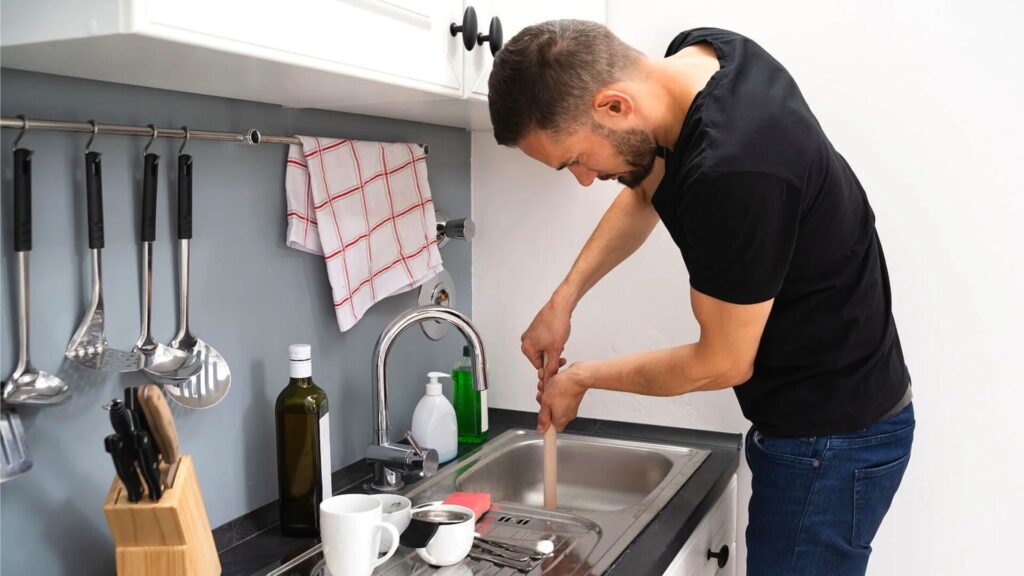Blocked Kitchen Sink – In the hustle and bustle of our daily lives, a clogged kitchen sink drain can be a major nuisance. Picture this: you’re washing dishes after a hearty meal, and suddenly the water in the sink starts rising, refusing to drain.
Don’t worry; you’re not alone in this! Clogged sinks are a common household woe, but the good news is that you don’t always need to call a plumber. In this guide, we’ll explore eight easy methods to unclog your kitchen sink drain and restore the smooth flow of water.
Identifying the Culprit: What’s Causing the Clog?
Before diving into the unclogging methods, it’s crucial to identify the cause of the blockage. Is it food particles, grease, soap scum, or a combination of these? Knowing the culprit helps in choosing the most effective method.

The Boiling Water Trick: Blocked Kitchen Sink
One of the easiest methods is pouring boiling water down the drain. Hot water can dissolve many substances that clog the pipes, especially if it’s grease-based. Be cautious if you have PVC pipes, as hot water can damage them.
Baking Soda and Vinegar Magic
A time-tested natural remedy involves mixing baking soda and vinegar. Pour half a cup of baking soda down the drain, followed by half a cup of vinegar. Cover the drain and let it sit for about 15 minutes. Then, flush it with hot water. This dynamic duo can break down grime and clear minor clogs effectively.
Unleashing the Power of a Plunger :Blocked Kitchen Sink
Plungers aren’t just for toilets; they work wonders on sink drains too. Place the plunger over the drain, ensuring there’s enough water to create a seal. Push and pull the plunger vigorously to dislodge the clog. It might take several attempts, but it’s a simple and inexpensive method.
The Trusty Plumbing Snake: A DIY Hero
For stubborn clogs, a plumbing snake can be your best friend. Insert the snake into the drain and rotate it to break up the clog. Pull out the snake, and you’ll likely bring the blockage with it. Remember to wear gloves and work slowly to avoid damaging the pipes.
Natural Cleaners: Environmentally Friendly Solutions : Blocked Kitchen Sink
Commercial drain cleaners can be harsh on your pipes and the environment. Opt for natural alternatives like salt, baking soda, and vinegar. Regularly flushing your drain with a mixture of these items can prevent clogs from forming in the first place.
Removing and Cleaning the P-Trap : Blocked Kitchen Sink
The P-trap, a U-shaped pipe under your sink, is a common spot for clogs. Place a bucket under the P-trap to catch water, then unscrew it. Clean out the debris, reattach the trap, and run water to see if the clog is gone. This method is particularly useful if you suspect the blockage is localized near the sink.
Calling in the Experts: When to Seek Professional Help :Blocked Kitchen Sink
If all else fails and your sink remains stubbornly clogged, it’s time to call a professional plumber. They have the expertise and tools to diagnose the issue accurately and resolve it efficiently. Don’t hesitate to seek help if you’re unsure or if the clog seems severe.
Prevention is Better than Cure: Tips to Avoid Future Clogs
Preventing clogs is easier than dealing with them. Avoid pouring grease down the drain, use a sink strainer to catch food particles, and run hot water regularly to prevent build-up. Regular maintenance can save you from the hassle of dealing with a clogged sink.
Conclusion
Dealing with a clogged kitchen sink drain might seem daunting, but with these easy and effective methods, you can tackle the issue head-on. Remember to identify the cause, choose the appropriate method, and consider preventive measures to keep your sink flowing smoothly. Don’t hesitate to seek professional help if needed, and happy unclogging!
Frequently Asked Questions
1. How can I prevent kitchen sink clogs?
Prevent clogs by avoiding pouring grease and large food particles down the drain. Use a sink strainer and run hot water regularly to prevent build-up.
2. Is it safe to use chemical drain cleaners?
Chemical drain cleaners can damage pipes and harm the environment. It’s safer to use natural alternatives like baking soda, vinegar, and salt.
3. Can I use a plunger on a double sink?
Yes, you can use a plunger on a double sink. Ensure the other side is sealed while plunging to create the necessary pressure.
4. When should I call a professional plumber?
If DIY methods don’t work or if you’re unsure about the issue, it’s best to call a professional plumber to diagnose and fix the problem.
5. Can clogged sinks cause other plumbing issues?
Yes, prolonged clogs can lead to pipe damage and even affect your entire plumbing system. It’s essential to address clogs promptly to prevent further complications.

